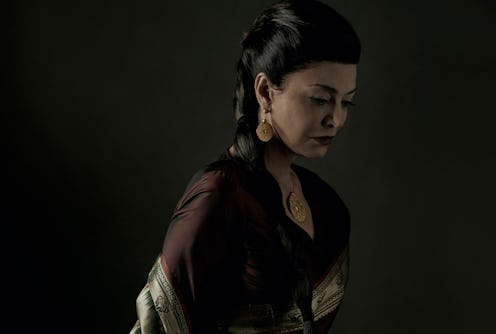
In SyFy's brand new series The Expanse , the future is here: The solar system is fully colonized, with even planets like Mars having been made habitable. It wouldn't seem like such a show could have connections to reality, but it does, and strong ones at that. In addition to the sci-fi aspects of the plot, The Expanse, premiering Monday night at 10 p.m., heavily doles out commentary about the nature of humanity and Earth's rapidly diminishing resources. That's the thing about the science fiction genre — though based around otherworldly storylines, it's often really a collection of metaphors for reality. This is something that immediately drew star Shohreh Aghdashloo to The Expanse . "All you need to do is to decode the metaphors and the symbols — my story is pretty Shakespearean... but you call it science fiction," she tells Bustle of her role in the series. "Although set in 200 years, it speaks relatively for today."
It's a pretty apt observation. Aghdashloo, who shot to mainstream stardom in the U.S. in 2004 after receiving an Oscar nomination for her spectacular performance in The House of Sand and Fog , portrays Chrisjen Avasarala in the series — the U.N. Deputy Undersecretary of Executive Administration who is two heartbeats away from governing the entire world. The conspiracy theories and backstabbing in her story not only enhance its dramatic elements, she says, but also add a level of realism that makes the storyline relatable to current global affairs. "[It's] timely and timeless... because when you watch it, you’re like, 'the same thing is happening all over again!'" she says. "Where on Earth are we going to learn new stuff and learn how to deal with each other rather than getting into fights with each other?"
While these themes are present in both the TV series and the set of books it's based on by James S.A. Corey, some changes were made from page to screen. In fact, Aghdashloo's character wasn't actually featured in the first novel, as she explains that bits and pieces of plots were borrowed from later books because the writers wanted Avasarala to appear in The Expanse's first season. It's easy to see why, especially when Aghdashloo describes Avasarala, who she feels was perfectly tailored for her, as "a powerful character." "The role is not only dimensional and captivating, but also — she’s a very strong, no-nonsense lady," the actress says.
"I’m always interested in powerful women, especially as an actress," Aghdashloo continues. "In real life, and as an actress, because most of the time, when I’m at the panels, I’m asked why we don’t see more strong female characters on the silver screen, or on television or in theaters... I think it’s a great character, because she could be sort of representative of all the strong women in the world." As for preparing for such an important role, Aghdashloo says she used her real-life heroes, "Margaret Thatcher, Madeline Albright, Indira Gandhi, Benazir Bhutto," as inspiration.
It is, of course, no secret that there's not exactly an excess of strong female characters in media — so the addition of Avasarala is a welcome one. Though television and film has seen an influx of characters like The Hunger Games' Katniss Everdeen, How to Get Away With Murder's Annalise Keating, and Game of Thrones' Daenerys Targaryen, there's still a massive shortage of complex female protagonists on the small and big screen, despite there being a massive amount of inspirational women in real-life. Aghdashloo has noticed this as well, but is hopeful for the future.
"There’s a shift happening in the whole world now. We're seeing more and more strong female leaders, role models, entrepreneurs, activists," she says. "We’re all thirsty to see their characters portrayed on television and in theaters and in plays." With actresses like Aghdashloo on television portraying characters like Avasarala, it's certainly a start.
Images: Syfy (2)